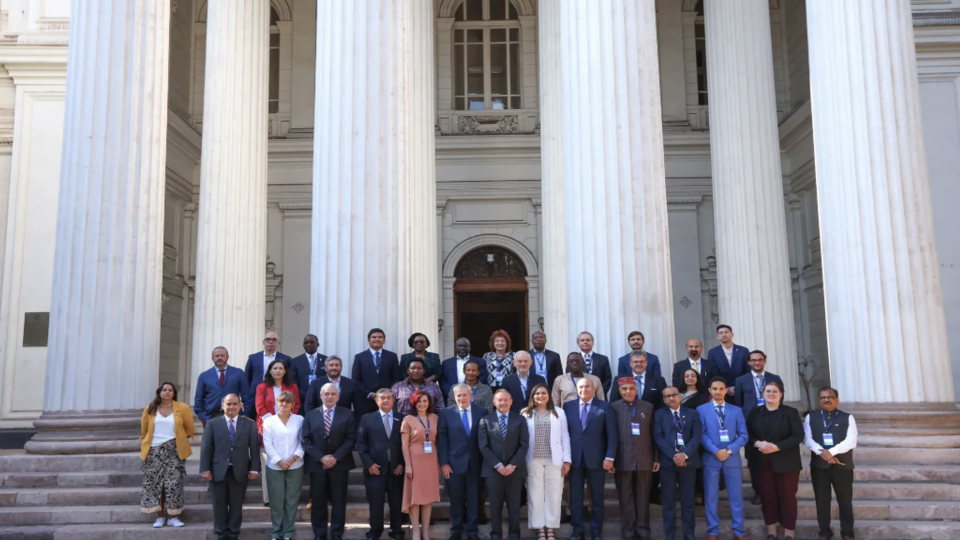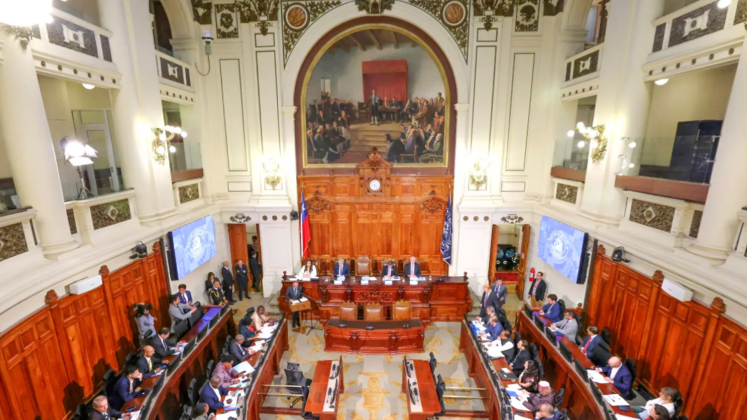The magnitude, complexity and transnational nature of today’s challenges are prompting parliaments around the world to rethink their legislative approaches. A growing number are building a political culture of anticipation – strengthening their capacity to identify, assess and prepare for future challenges, both domestically and through coordinated international efforts.
In January, the Chilean Senate’s Committee of the Future and the Inter-Parliamentary Union hosted the Third World Summit of Parliamentary Committees for the Future. This high-level forum brought together 17 parliamentary committees to build on the legacy of the Summit of the Future and strengthen a form of global governance that anticipates rather than reacts to future challenges.
A new hope for forward-looking legislation: Committees for the Future
The concept of a permanent parliamentary body dedicated to long-term policy planning was first implemented in Finland in the early 1990s. Amid a severe economic recession following the collapse of the Soviet Union, the Finnish Parliament, Eduskunta, established a temporary Committee for the Future to evaluate the Government’s first "Report on the Future". The Committee was so effective that it continued to review and respond to each new Government’s future-oriented reports, until it became a permanent parliamentary committee in 2000. Today, it plays a crucial role in integrating long-term thinking into Finnish policymaking, serving as a bridge between scientific research and legislative action, and is recognized as a global model for parliamentary foresight.
Despite the ever-increasing need to foresee future challenges, policymakers often resist preventative approaches and instead defer decision-making until crises emerge...
At present, there are at least 14 Committees for the Future or equivalent foresight bodies operating across Latin America, Europe and Asia. While some initiatives have failed to take root, others have matured into influential institutions with growing international engagement.
| Country | Year | Committee/Commission | Duration/Present situation |
| Finland | 1993 | Committee for the Future (Eduskunta) | Active |
| Israel | 2001 | Commission for Future Generations | Disbanded in 2006 |
| Mexico | 2004 | Special Futures Comisión (Lower House) | Disbanded in 2006 |
| Scotland (Regional) | 2005 | Scotland Futures Forum (Parliament) | Active |
| Chile | 2012 | Senate Commission for Future Challenges, Science, Technology and Innovation | Active |
| Brazil | 2013 | Senate Futures Commission | Active |
| Germany | 2015 | Bundesrat Commission for Innovation, Technology and the Future | Failed |
| Austria | 2015 | Commission for Innovation, Technology and the Future | Active |
| UK | 2017 | Parliamentary Group for Future Generations | Active |
| Estonia | 2017 | Center for Foresight – Institute for Research (answering to the Riigikogu) | Active |
| Argentina | 2019 | Futures Commission | Failed |
| Philippines | 2019 | Committee for Sustainable Development, Innovation and Future Thinking (Senate) | Active |
| South Korea | 2020 | Parliamentary Foresight Commission (National Assembly) | Active |
| Lithuania | 2020 | Futures Commission | Active |
| Uruguay | 2021 | Special Futures Commission | Active |
| Paraguay | 2022 | Congressional Futures Commission (lower house members) | Active |
| Iceland | 2018 | Committee for the Future (Althingi) | Active |
Creating and maintaining foresight bodies within parliaments is not an easy task. Despite the ever-increasing need to foresee future challenges, policymakers often resist preventative approaches and instead defer decision-making until crises emerge, focusing on immediate issues rather than long-term preparedness.
The distinct role of Committees for the Future can be undermined when treated like standard parliamentary committees, which typically focus on immediate or “urgent” demands, leaving broader trends and systemic shifts that could shape or constrain public policy outside the main scope of debate. In contrast, Committees for the Future are designed to develop a foresight- and anticipation-based legislative and governance framework that supports Governments to address emerging challenges over the medium and long term, building their resilience and long-term stability.
One example of the anticipatory work carried out by Committees for the Future is emerging risks – such as the potential misuse of AI and data management that could lead to a "data winter" – as well as forward-looking debates on emerging fields like neurolaw and the protection of brain data and cognitive integrity. In Chile, several of these topics have already been incorporated into legislation through the Senate’s Committee for the Future.
A growing movement towards more anticipatory governance in parliament
The first World Summit on the Committees of the Future took place in Finland in 2022. The Summit gathered all existing Committees of the Future from around the world to discuss global challenges related to the environment, technology regulation and inter-parliamentary cooperation. Delegates agreed on eight points to guide future discussions and cooperation.
The Second World Summit, held the following year in Uruguay, was attended by 70 countries and continued discussions around technological development, the legal standardization of AI and inequalities concerning its use and access. The Summit explored how parliaments could enhance the use of strategic foresight in preparation for the United Nations’ 2024 Summit of the Future.
The Third World Summit took place this past January in Santiago, Chile. The 17 parliamentary delegations in attendance focused on four principal challenges: the rapid development of AI, contamination of the oceans, the present and future of outer space, and digitalization.
These Summits have reinforced the need to embed foresight within parliamentary structures and reaffirmed global commitments to embrace a long-term perspective focused on the well-being of future generations.

Specifically, the motions adopted at these Summits call on Member States to strengthen the capacities of parliaments to use anticipatory governance, encourage parliaments to submit future-oriented reports and strategies, and promote inter-parliamentarian cooperation.
Delegates at the Third Summit, in particular, made clear that Committees for the Future are not optional practices, but necessary components of national and global resilience.
Delegates at the Third Summit, in particular, made clear that Committees for the Future are not optional practices, but necessary components of national and global resilience. They also ratified their adherence to the principles of the Global Digital Compact and the Declaration on Future Generations, promising to empower youth while bearing in mind the impacts of their decisions on future generations. These agreements will continue to develop during future Summits; Kenya, Uganda and Morocco have all expressed interest in hosting the Fourth Summit.
Anticipating the UN Special Envoy for Future Generations
All three Summits have helped advance a shared vision of anticipatory governance across State structures, encouraging investment in foresight research and promoting practices such as periodic long-term reporting, exemplified by Finland’s model. While the focus has largely been on increasing the use of futures thinking, these efforts point to a deeper structural need: the establishment of permanent, public institutions within parliaments tasked with analysing trends, modeling scenarios and assessing long-term risks. These bodies would support decision-making that strengthens State resilience and considers the rights and well-being of both current and future generations.
In this context, the UN Special Envoy for Future Generations could play a catalytic role – not as a normative or enforcement body, but as a generator of anticipatory knowledge at the multilateral level. By producing independent, technical assessments, the Envoy’s work could help bridge the gap between scientific foresight and political decision-making, offering States a counterweight to short-term pressures.
To make this vision a reality, institutionalizing anticipatory governance requires both political will and durable frameworks. National Committees for the Future are key instruments in this process. Strengthening networks of parliamentary foresight bodies, such as on-going efforts in Latin America and the Caribbean, and continuing to build momentum through the CF Summits, will be critical to enabling Governments to prepare for uncertainty and to legislate with future generations in mind.

